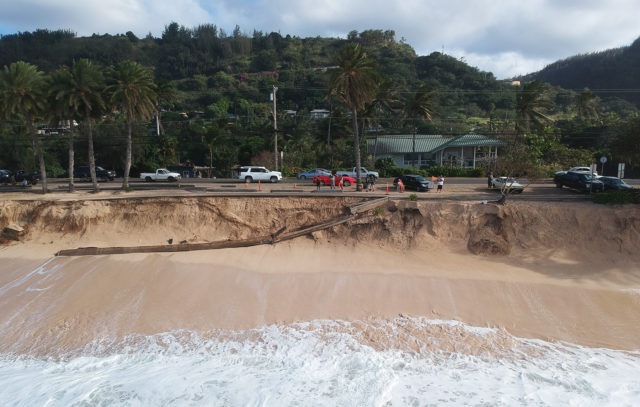Climate change hurting oceans — and us — more than expected
 Sea level rise, increasing faster due to climate change, has accelerated erosion in Hawai‘i, such as Sunset Beach on the north shore of O‘ahu. Image courtesy of Anthony Quintano/Civil Beat.
Sea level rise, increasing faster due to climate change, has accelerated erosion in Hawai‘i, such as Sunset Beach on the north shore of O‘ahu. Image courtesy of Anthony Quintano/Civil Beat.The effects of climate change are bad, and they’re getting worse — especially when it comes to the world’s oceans. But if unprecedented action is taken soon to reduce planet-warming emissions, it will greatly ease some of the worst impacts and make adaptation less painful. That’s the underlying message in a landmark report by more than 100 scientists from 36 countries. The Intergovernmental Panel on Climate Change (IPPC) on Tuesday 24 September 2019 approved the Special Report on the Ocean and Cryosphere in a Changing Climate, which was three years in the works.
Marine heatwaves don’t just affect the oceans, though the warmer waters are also putting corals in peril and reducing the abundance of certain fish. They are also making it hotter on land. Meteorologists blame heatwaves for the record heat Hawai‘i has experienced this summer, and they may exacerbate wildfires.
Sea levels rose globally about a half foot last century. Now they’re rising more than twice as fast and getting faster. Sea level could rise 1 to 2 feet by 2100 even if global warming is limited to well below 2° C, but it could rise 2 to 3.6 feet if greenhouse gas emissions continue to escalate. That’s a big deal for Hawai‘i, where most of the state’s 1.4 million residents live close to the coast and it’s also where major infrastructure is located. The tourism industry that the overall economy depends on also depends on the coastal environment.
“We are in a critical set of years for the entire history of humanity,” climate researcher Chip Fletcher, professor of Earth Sciences and associate dean of SOEST, said. “But we can never give up. We can never stop. It’s always going to be a crisis until we decarbonize.”
Read more about it in the Honolulu Civil Beat.




